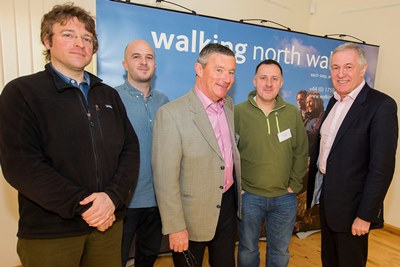
Internet giant Google will be digitally mapping tourist hotspots in North Wales with the same advanced technology they used in the iconic Grand Canyon.
The news was revealed at the third annual Outdoor North Wales Forum organised by Tourism Partnership North Wales to highlight new developments in the outdoor sector, including a major new marketing campaign.
Google will deploy their rapid-shooting cameras to capture the mountains of Snowdonia, large stretches of the Wales Coast Path from Chester down to Barmouth along with other parts of North Wales.
The state of the art cameras will not be mounted on the company’s usual airplane or a car – instead they’ll be pointed from the backpacks of a team on operatives working their way through the area on foot.
Details of the next ambitious stage of Google Earth, the virtual globe, map and geographical information program which enables computer users to zoom in on areas from space down to street level, were revealed during at the Forum.
The event at the Glasdir Centre in Llanrwst attracted around 200 outdoor activities industry professionals and was organised in conjunction with Visit Wales, The Outdoor Tourism Project and Snowdonia Active.
Delegates from every branch of the industry and associated groups heard from a total of 23 speakers, including Ed Parsons, a senior member of the Google team who is a qualified cartographer.
Other speakers included Phil Benbow, from Llanberis Mountain Rescue Team; Gwenda Owen , from the Ramblers’ Association; Quentin Grimley, Countryside Council for Wales; Rhys Davies Outlook Expeditions and Jon Merrick, from The Outdoor Tourism Project.
Mr Parsons said his Silicon Valley-based corporation was planning to capture images for Google Earth of the mountains of North Wales.
The exercise would use exactly the same technology which the company had devised to intricately map the vast and mostly inaccessible Grand Canyon in Arizona – cameras fitted to the backpacks of operators known as “trekkers” who were able to walk along filming dizzlingly high pathways and tracks which Google’s planes and cars had no chance of reaching.
Mr Parsons said: “The specially designed cameras, controlled by a mobile phone app, are carried by the trekkers are in 20 kilogram packs strapped to their backs and they automatically take pictures every two-and-a-half seconds.
“We are really excited about bringing this level of technology to the UK.”
Mr Parsons explained Google was looking at places popular with walkers in the region, from the Dee Valley around Llangollen to the Wales Coast Path, which includes miles of stunning countryside including the Dee Estuary, Flintshire, Denbighshire, Conwy and Gwynedd.
Dewi Davies, Tourism Partnership’s Regional Strategy Director, unveiled their latest branding strategy which carries the message that North Wales is the Heart of Adventure.
Mr Davies said: “Quite simply, there is probably nowhere else in the world where there is such a concentration of high class adventure and activity based holidays on offer.
“North Wales is very accessible. We’re three hours from London, two hours from Manchester and Birmingham.
“You can be coasteering, climbing and jumping into the sea and a half an hour later you can be canoeing in the mountains.
“We now also boast the longest zip line in Europe – the 1,500 metre long zip line is located in the disused part of Penrhyn slate quarry in Bethesda, which has the ultimate aim of attracting 30,000 visitors a year.”
Rory Fegan, of the branding and design company Pearlfisher, said the Heart of Adventure brand was designed to reflect North Wales’ strengths, such as quality activities, variety of adventure and a passion for the outdoors.
TPNW is now encouraging outdoor businesses to use the brand on their marketing material, websites and conversations with potential customers.
Carole Startin, Tourism Partnership’s Marketing and Events Executive, was delighted by the success of the forum.
She said: ” We’ve had some very positive feedback so it was definitely our best ever event for the Outdoor Sector so far. As well as having excellent speakers, it was a great opportunity for attendees to network with colleagues in the sector and meet new contacts which can help their business or help each other.”
The forum was also attended by Walk on Wales, an initiative this summer by members of the Welsh Guards to raise £1 million for their regiment’s Afghanistan Appeal and Combat Stress.
Carrying a specially commissioned silver baton bearing the names of the 50 Welsh Guardsmen who have died in action since the end of World War Two, teams will tackle 11 separate walks along the 870 miles of the Wales Coast Path in August.